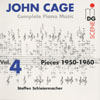Cage Complete Piano Music, Vol 4
A further instalment in Steffen Schleiermacher's impressive series of John Cage's piano music, and an issue that maintains the high standard set so far
View record and artist detailsRecord and Artist Details
Composer or Director: John Cage
Label: Dabringhaus und Grimm
Magazine Review Date: 2/2000
Media Format: CD or Download
Media Runtime: 119
Mastering:
DDD
Catalogue Number: MDG613 0787-2

Tracks:
| Composition | Artist Credit |
|---|---|
| Winter Music |
John Cage, Composer
John Cage, Composer Steffen Schleiermacher, Piano |
| Water Music |
John Cage, Composer
John Cage, Composer Steffen Schleiermacher, Piano |
| For M. C. and D. T. |
John Cage, Composer
John Cage, Composer Steffen Schleiermacher, Piano |
| For Paul Taylor and Anita Dencks |
John Cage, Composer
John Cage, Composer Steffen Schleiermacher, Piano |
| TV Koeln |
John Cage, Composer
John Cage, Composer Steffen Schleiermacher, Piano |
| Waiting |
John Cage, Composer
John Cage, Composer Steffen Schleiermacher, Piano |
| (7) Haiku |
John Cage, Composer
John Cage, Composer Steffen Schleiermacher, Piano |
| Haiku |
John Cage, Composer
John Cage, Composer Steffen Schleiermacher, Piano |
| Music Walk |
John Cage, Composer
John Cage, Composer Steffen Schleiermacher, Piano |
| Solo for Piano |
John Cage, Composer
John Cage, Composer Steffen Schleiermacher, Piano |
| 34' 46.776'' for a Pianist |
John Cage, Composer
John Cage, Composer Steffen Schleiermacher, Piano |
Author: Peter Dickinson
I discussed the first two volumes of this series in detail (3/98, A/98), mentioned the third volume, consisting of 'Music of Changes' in brief, and now we have pieces from the decade 1950-60. Most of them are not notated conventionally but allow the performer into the process of creating the music. Schleiermacher, with typical thoroughness, explains his approach in detail in the CD booklet.
Winter Music can be played by anything from one to 20 pianists. Schleiermacher decided on a version for 10 pianos, making all the tracks himself, and the textural variety of this piece emerges recognisably. Water Music from 1952 (confusingly retitled here asArolsen, February 8, 1998 - a permitted option) is an early classic of music theatre where the pianist uses various props such as a bowl of water and a radio in a strictly timed schedule. Music Walk has theatrical elements too as the player travels from one instrument to another and various noises are included.
Solo for Piano, from the same period, is the piano part of the Concert for Piano and Orchestra, premiered in the 1958 Cage Retrospective at New York Town Hall when it was recorded complete with audience protest. Schleiermacher's version lasts over half an hour in a fastidiously planned realisation that derives everything possible from carefully contrasted textures. The 21 tracks helpfully reflect the layout - for example the enchanting toy piano at track 12, which appears again at the end duetting
with the grown-up piano, and the subtle effects on the inside of the piano on track 14.
The drama initiated by Cage in these indeterminate pieces is comparable to the pacing in the plays of Samuel Beckett - seemingly unpredictable but, against all the odds, continuously engaging at the time.
Some pieces are completely notated - the Webernian Seven Haiku or the earlier Haiku, innocently diatonic almost in the manner of Satie. As before, Schleiermacher's wizardry gets the best out of everything and the recording is again excellent. Riches indeed and still moreto come.'
Winter Music can be played by anything from one to 20 pianists. Schleiermacher decided on a version for 10 pianos, making all the tracks himself, and the textural variety of this piece emerges recognisably. Water Music from 1952 (confusingly retitled here as
Solo for Piano, from the same period, is the piano part of the Concert for Piano and Orchestra, premiered in the 1958 Cage Retrospective at New York Town Hall when it was recorded complete with audience protest. Schleiermacher's version lasts over half an hour in a fastidiously planned realisation that derives everything possible from carefully contrasted textures. The 21 tracks helpfully reflect the layout - for example the enchanting toy piano at track 12, which appears again at the end duetting
with the grown-up piano, and the subtle effects on the inside of the piano on track 14.
The drama initiated by Cage in these indeterminate pieces is comparable to the pacing in the plays of Samuel Beckett - seemingly unpredictable but, against all the odds, continuously engaging at the time.
Some pieces are completely notated - the Webernian Seven Haiku or the earlier Haiku, innocently diatonic almost in the manner of Satie. As before, Schleiermacher's wizardry gets the best out of everything and the recording is again excellent. Riches indeed and still moreto come.'
Discover the world's largest classical music catalogue with Presto Music.

Gramophone Digital Club
- Digital Edition
- Digital Archive
- Reviews Database
- Full website access
From £8.75 / month
Subscribe
Gramophone Full Club
- Print Edition
- Digital Edition
- Digital Archive
- Reviews Database
- Full website access
From £11.00 / month
Subscribe
If you are a library, university or other organisation that would be interested in an institutional subscription to Gramophone please click here for further information.




